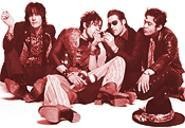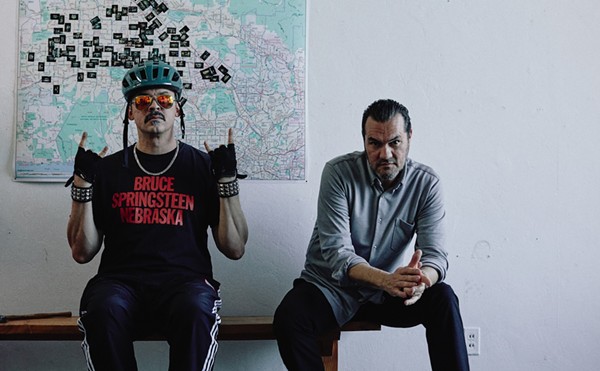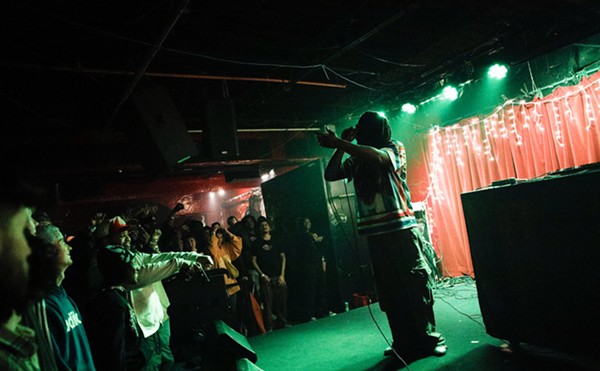Beginning in Spokane, Washington, as the Haymakers, the band shortened its name to simply the Makers and adopted the moniker as the members' collective surname. Like any garage rock band worthy of the title, the Makers started out brawling with audiences at gigs, touring in a black Bonneville hearse, and recording an amazing amount of material in a ridiculously short amount of time. All of which has defined the band's rise to relative fame over the past decade.
"We were pretty much all teenagers when we put out our first album," says singer Michael Shelley (they've finally dropped their Maker surnames) via phone from his home in Seattle. "And it was probably much more angry in a blatant kind of way. The music was faster and more intense, the lyrics were blatantly vicious. It all stemmed from the way we were brought up. There were a lot of these common issues with being young and growing up in a small town. Each album is kind of a step away from that. Everything we do is autobiographical, and I think for it to be that way, it demands evolution. We're all growing and getting older, and the music is going to change if we want to be sincere. We decided early on to be very honest in our music and only write about what we know and keep it interesting in that way. That's the way that we've chosen to make our music."
The Makers had stayed true to a fairly simple career path until their last album, 1998's Psychopathia Sexualis, which had critics and fans lining up and taking numbers to hand out praise. Although the Makers are light years away from the band that created Howl in 1993, Shelley admits that the changes probably seem more drastic from the outside.
"To me, it doesn't feel like a whole lot of growth," says Shelley. "It just seems like a year's worth of growth, or a year's worth of problems that needed to be dealt with. Every album has been a synopsis of that year, summing it up. To me, that's what Psychopathia Sexualis was. That's where we were at the time, and this is where we are now. There's no telling where this year will lead us."
Whatever triggered it, the previous year has resulted in Rock Star God, an incredibly dense piece of conceptual writing and playing that details (what else?) the rock and roll lifestyle. The album has deservedly gotten rave reviews -- most recently, it received a favorable writeup in Rolling Stone, with Cleveland's Cobra Verde, under the banner "Sucking in the '70s." Like some kind of rock opera, the album begins with a segment that introduces the band with a description of an excited audience waiting to see the band in a smoky club. A voice cries out, "Ladies and gentlemen, boys and girls, we introduce tonight the glory of rock and roll from the depths of the soul -- the Makers!" Shelley admits that the album was not originally intended to make a statement quite this big.
"During the songwriting process, the concept was born," he recalls. "I started feeling that singular vision, and we just kind of ran with it. Due to the concept, the songwriting was a little more methodical, and we plotted the direction of the album a little more. We wanted certain songs to have a certain mood, and we definitely had that in mind, without being contrived. That kind of dictated the songwriting process."
Both Psychopathia Sexualis and Rock Star God have a richer, glammy sort of veneer, reminiscent of early Pretty Things, but Shelley has his own ideas about how the Makers sound.
"With every band, the music they listen to shows through in the music they make," Shelley notes. "What we do has always been a big mishmash of different styles. It never sounded like anything in particular to me. We were compared to a lot of '60s bands. To me it didn't sound like '60s music, and I think to most people, it's the same, especially to young people who don't have that baggage attached to the music. To them, they're not hearing the Seeds, because they don't know who the hell the Seeds are. On this album, there is what most people would consider a more diverse frame of reference, but it doesn't sound blatant or sampled to me. We are all music lovers, and that's one of the reasons we keep making music: because we love it. And we're not going to pretend that we're trying to invent something new."
While Rock Star God toys with a theme as old as the genre itself, the Makers have managed to find a fresh approach to the formula. Shelley notes with suitable shock just how important the studio has become for the band.
"We recorded the basic tracks live -- guitar, bass, drums. Then we kind of layered sounds on top of that," he explains. "We wanted something that sounded pretty exciting. We did add instrumentation on this album, but it's all real instruments, which gives it a lush, warm sound. We recorded and mixed this album in two weeks, and that's the most we've ever spent on an album by far. It's the old-fashioned way of doing things. It's definitely a big-sounding album, and it's also done in a traditional sense. It sounds like a rock and roll album."
The range of material that now exists for the Makers, from sonic blurts reminiscent of the seminal Stooges to this most recent sound, creates at least a little tension when the band has to put together its live set list and devise its touring strategy. Because the band always has its evolution in the back of its mind, it never gets too precious about what to include in the sets.
"Every year when we go out, the shows are very different, with the same energy, but with a slightly different delivery," Shelley notes. "We try to keep updated -- we don't ever play really old songs. We usually play songs off of the last two albums, and we rarely get nostalgic. We write songs all the time, so we're always interested in keeping ourselves interested, as opposed to playing the "hits' for the kids."
Although the material on Rock Star God presents some interesting challenges, with guests playing everything from saxophones to violins, Shelley says that the Makers are ready to tackle them head on. They've already done some live tinkering during a handful of local Seattle dates, a practice that has worked well for them in the past.
"We've played some shows here in town, and it was mainly new material," Shelley says. "We can get away with more in Seattle, because people are more familiar with us. We can break down and do some acoustic songs or have guest musicians. Audiences are more aware of us as people and the little changes that we've made through the years. People keep pretty tight scrutiny over us, so we experiment a lot more here. So we've done a lot of the Rock Star God material, and it's been received very well. We've gained so many more fans just with the diversity of the new album."
And even though there is a definite thematic thread that runs through Rock Star God, Shelley and his fellow Makers (guitarist Jamie Frost, bassist Don Virgo, and drummer Jay Cassady) don't harbor any Floydian desires to mount a stage show with lasers and inflatable livestock. They prefer to let the material speak for itself.
"We do have these pretty grandiose ideas, but we don't have the money to finance it," he says with a laugh. "It would be nice to have a string quartet and backup singers live, but we're not Beck. We can't afford that. But it still has that overall feeling to it. People will know the difference. The live show is definitely not as big a step as the album. The two are very distinct. We never want to re-create the stage when we're in the studio, and vice versa. When we're in the studio, we're definitely in the studio. And when we're onstage, we're definitely playing a live show. It's just the four of us, enjoying the moment. It's more about the energy than the production."













